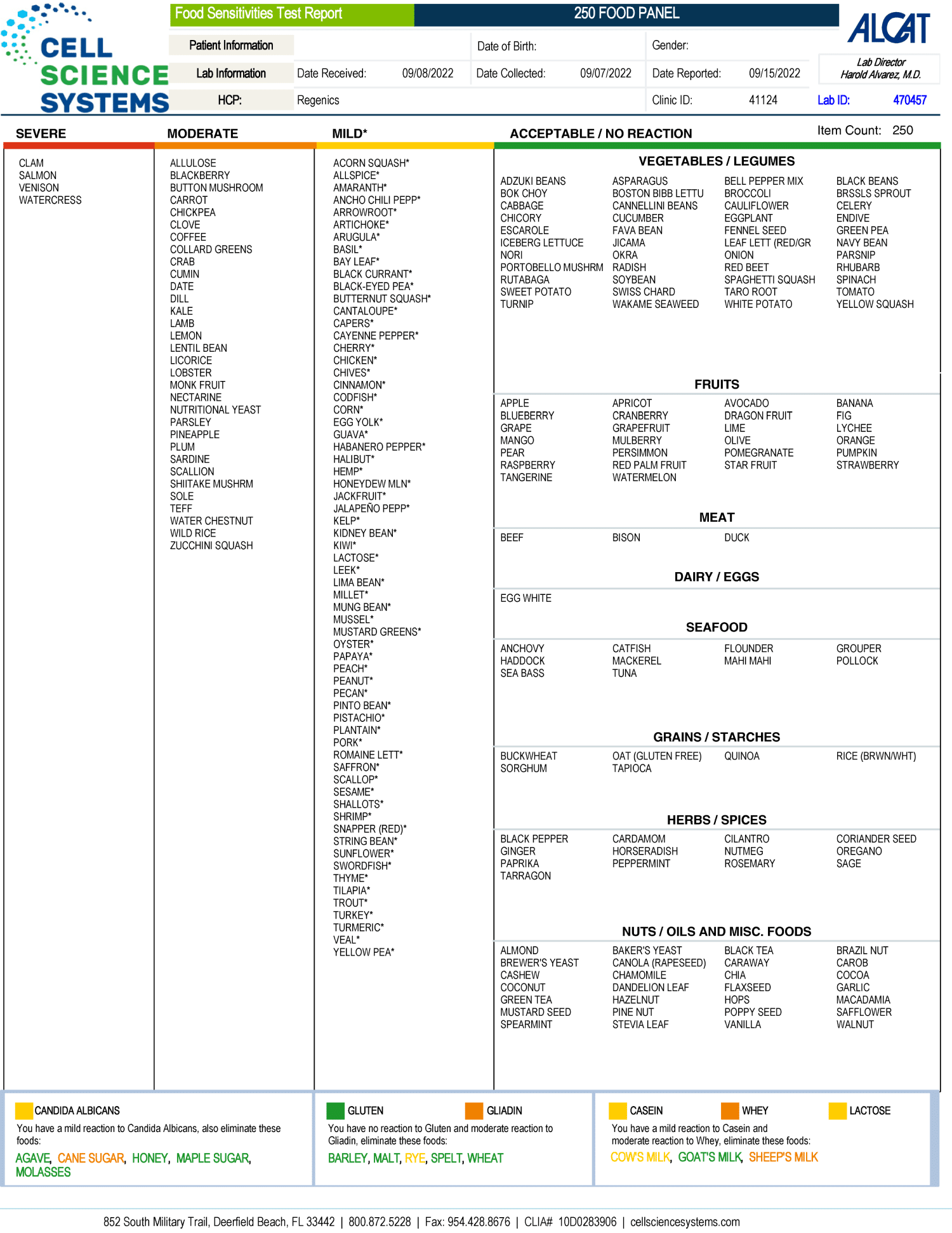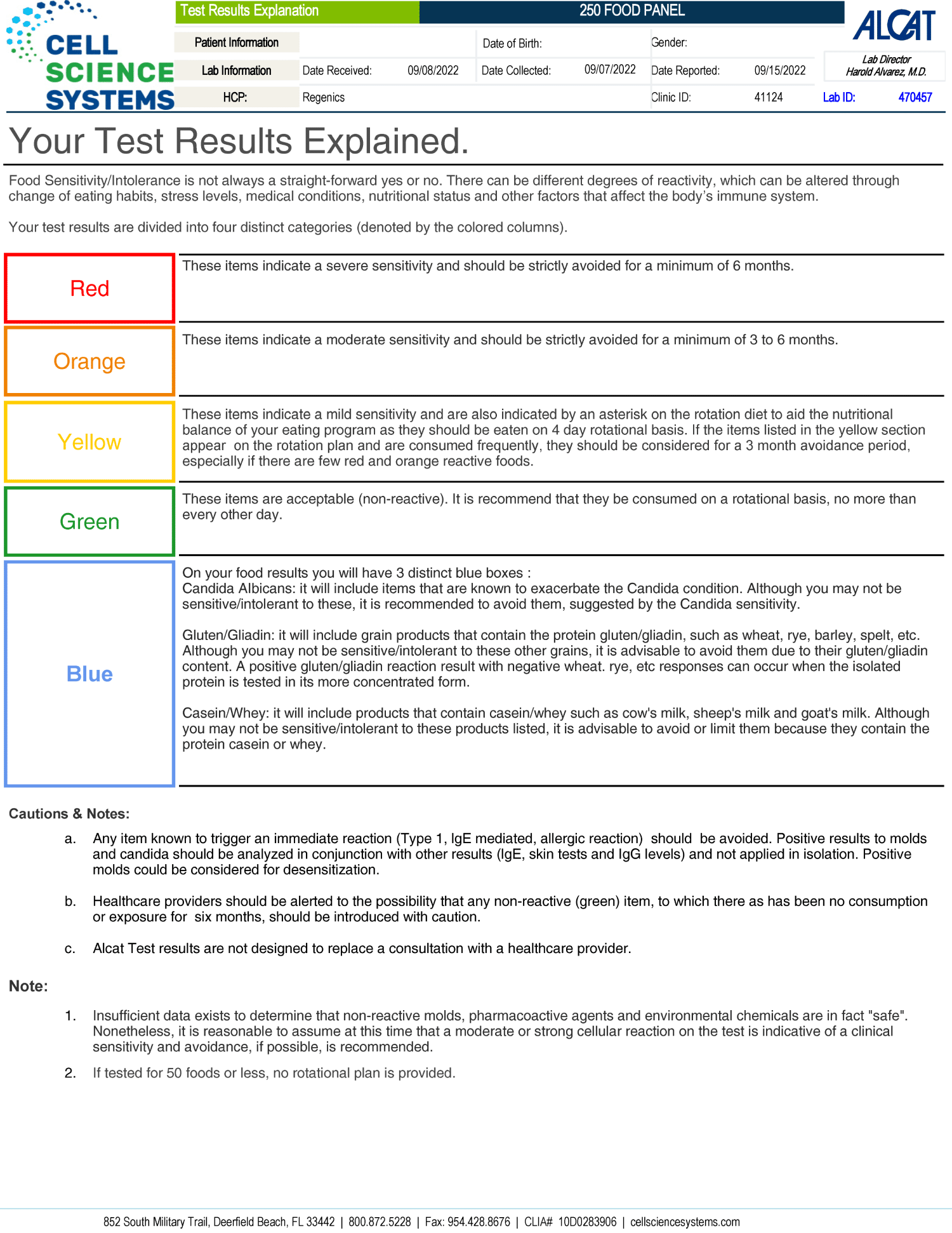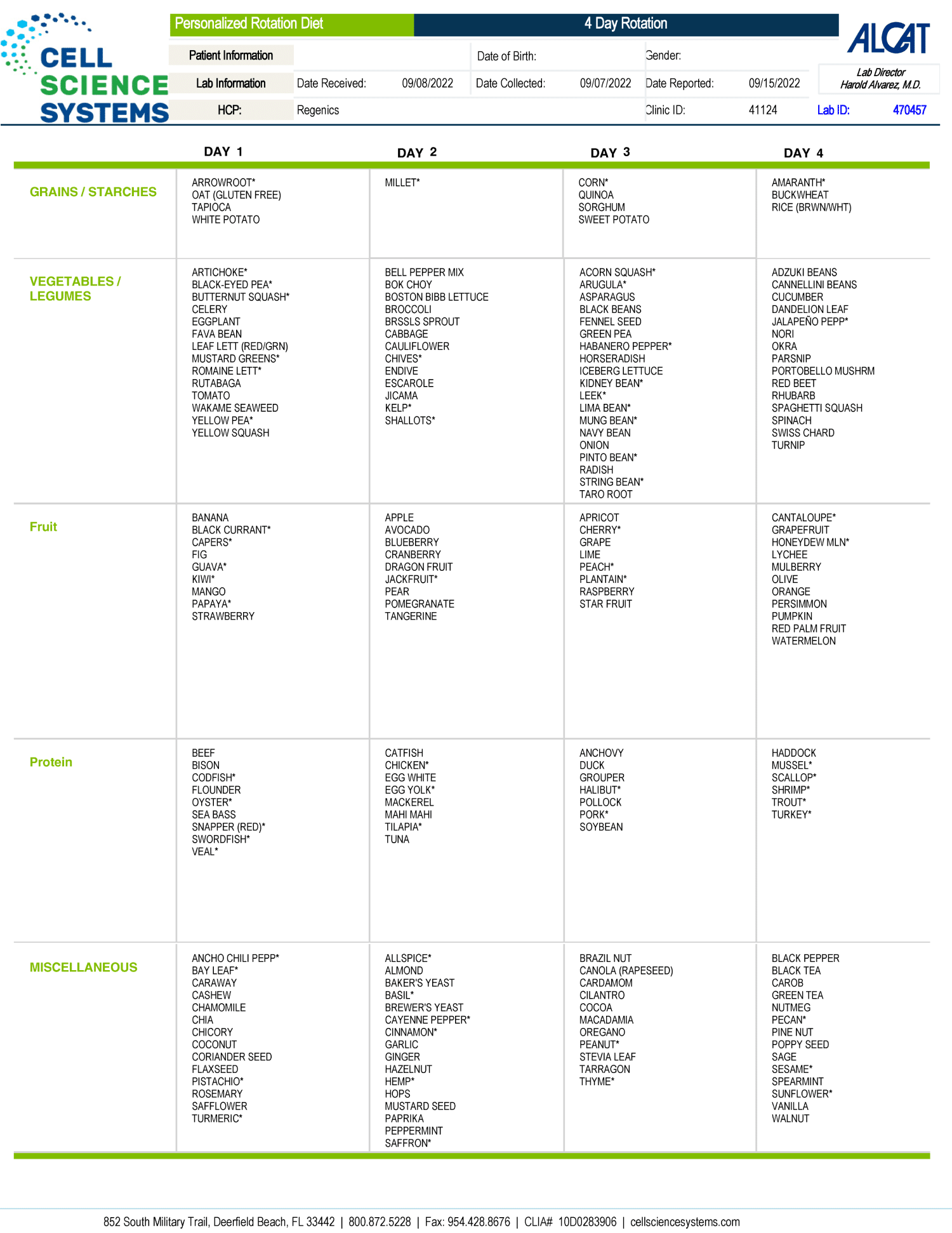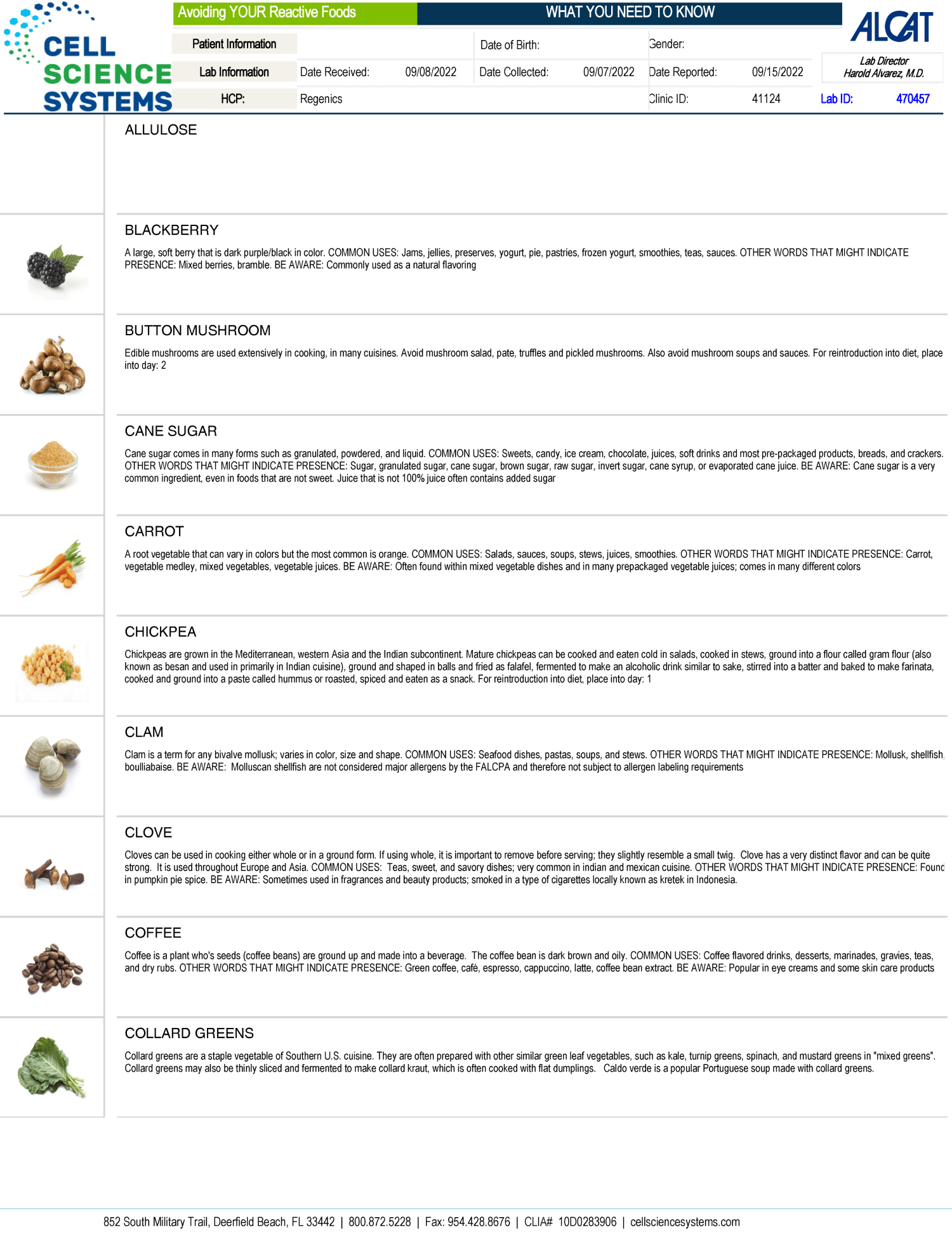FOOD SENSITIVITY TESTING
BOOK AN APPOINTMENT TODAY
Make your health a priority. We look forward to meeting you.

FOOD SENSITIVITY TESTING
The Regenics Food Sensitivity Testing can identify foods, milks, and spices that are causing your symptoms. This includes chronic pain or other medical problems you may have today as well as a higher risk for developing future diseases because inflammation caused by these problems will never go away completely without treatment! Food Sensitivity Testing identifies the specific ingredients in food which cause us discomfort when we eat them – from stomach aches to skin irritation & more serious conditions. Over 100 Food Sensitivity Testing in our industry-leading test.
The Food Sensitivity Testing is a quick blood draw of one sample that is analyzed in our lab against three controls of each food. This helps ensure accurate and reproducible results. Blood draws are the safest way to tests for food sensitivity as it does not allow for the possibility of an anaphylactic response in the way that a finger prick could. Our Food Sensitivity Testing is also safe for those who have skin disorders. Additionally, our Food Sensitivity Testing is not effected by medications such as antihistamines.
REGENICS' FOOD SENSITIVITY TESTING INCLUDES TESTING FOR SENSITIVITIES TO:
-
- Beef
- Chicked
- Egg White
- Egg Yolk
- Lamb
- Pork
- Turkey
- Duck
- Goose
- Grapevine Snail
- Rabbit
- Veal
-
- Beta-Casein
- Casomorphin
- Cow’s Milk
- Goat’s Milk
- Whey Protein
- Buffalo Milk
- Buttermilk
- Cheddar Cheese
- Kefir
- Sheep’s Milk
- Yogurt
-
- Alaska Pollock
- Catfish
- Codfish
- Halibut
- Lake Trout
- Mackerel
- Perch
- Salmon
- Tuna
-
- Crab
- Lobster
- Shrimp
- Clam
- Oyster
- Scallops
-
- Barley
- Malt
- Oats
- Rye
- Wheat
- Amaranth
- Brown Rice
- Buckwheat
- Corn
-
- Kidney Bean
- Navy Bean
- Peanuts
- Soybean
- Broad Bean
- Chickpea
- Mung bean
- Black Bean
- Pinto Bean
- Black-eye peas
- Lentils
-
- Almond
- Black Walnut
- Cashews
- English Walnut
- Pecan
- Sweet Chestnut
-
- Apple
- Apricot
- Avocado
- Banana
- Blackberry
- Blueberry
- Cantaloupe
- Cherry
- Coconut
- Cranberry
- Grape
- Grapefruit
- Honeydew Melon
- Olive
- Orange
- Papaya
- Peach
- Pear
- Pineapple
- Raspberry
- Strawberry
- Tomato
- Watermelon
-
- Bamboo Shoots
- Broccoli
- Cabbage
- Carrot
- Cauliflower
- Celery
- Cucumber
- Garlic
- Green Bean
- Green Peas
- Leek
- Lettuce
- Lima Bean
- Mushrooms
- Seaweed (Kelp)
- Spinach
- Squash
- Ginger
- Sweet Potato
- Taro Root
-
- Green Pepper
- White Potato
-
- Coriander
- Mustard
- Sesame
- Sunflower
-
- Black Pepper
- Cinnamon
- Hot Paprika Powder
- Nutmeg
- Woo-hsaing Powder
-
- Cocoa
- Coffee
- Hops
- Oolong Tea
- Rosemary
- Thyme
- Vanilla Bean
- Yeast
RESULTS, INTERPRETATION, AND SOLUTIONS
Your Food Sensitivity Testing results will be reviewed by our team of wellness providers. While the Food Sensitivity Testing result does not always equate with symptoms, it can help prioritize the foods selected for a temporary elimination diet. Choosing the right foods for you can increase your energy while reducing inflammation and other symptoms. Equally important to identifying the foods you should eliminate from your diet is identifying the foods that you are not sensitive to. This provides more dietary freedom to enjoy foods that you might be unnecessarily avoiding.
When you feel better, you perform better.
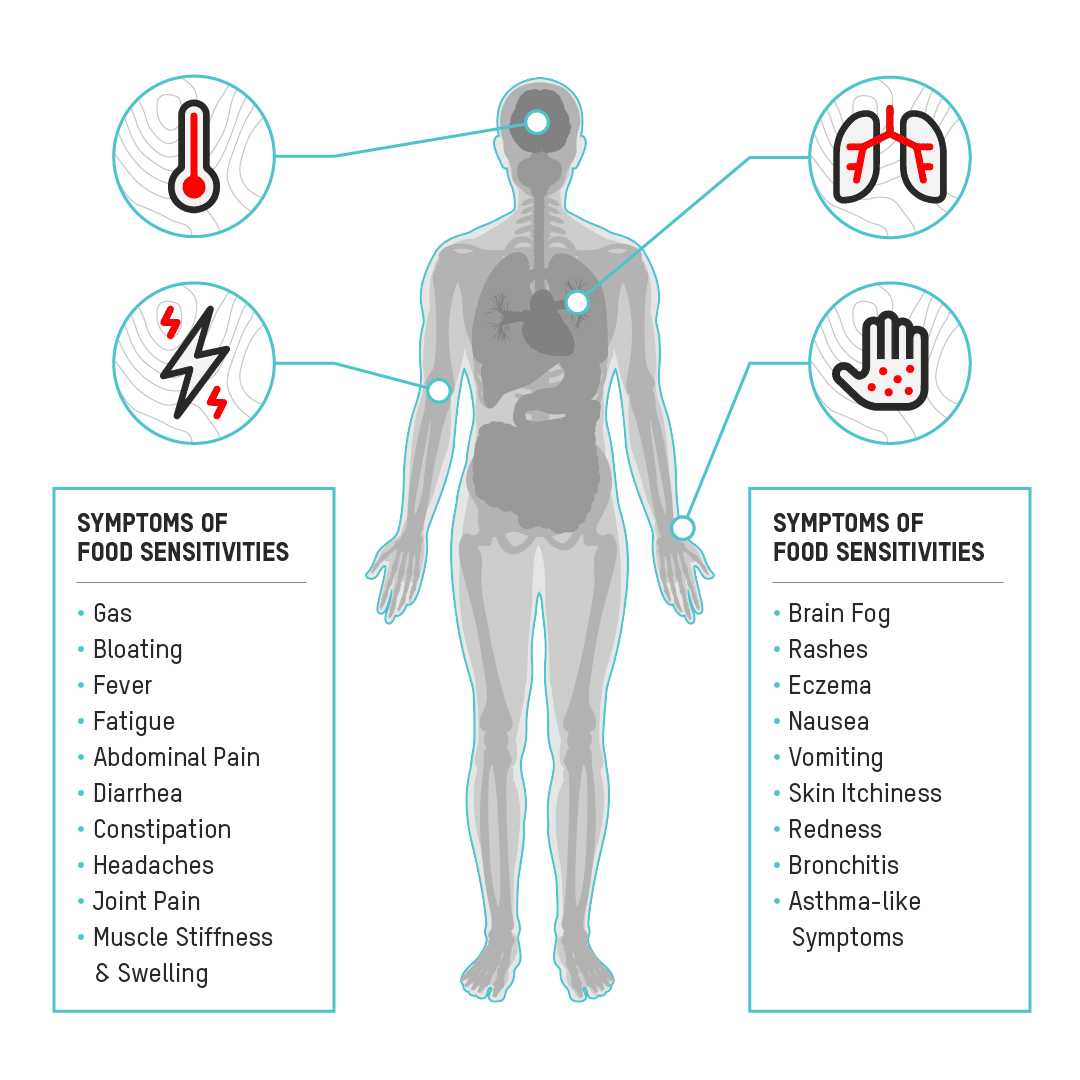
Sensitivity vs. Allergy
It is not uncommon for a food intolerance to be mistaken as a food allergy or vice versa. For example, some people who have a wheat intolerance may think that they have a wheat allergy; however, these two conditions are quite different. Some food intolerance arise from specific enzyme deficiencies in the body. For example, people who have a lactose intolerance lack enough of the enzyme lactase to break down the sugars in milk, causing gastrointestinal discomfort when they consume milk products (various kinds of lactose intolerance tests exist which may help with diagnosis of this condition). On the other hand, a food allergy is an IgE immune response that can result in a number of different symptoms, some that can even be life-threatening.
Food sensitivities symptoms can be the result of:
- Not having the right enzymes you need to digest a certain food
- Reactions to food additives or preservatives like sulfites, MSG, or artificial colors
- Pharmacological factors, like sensitivity to caffeine or other chemicals
- Sensitivity to the sugars naturally found in certain foods like onions, broccoli, or Brussels sprouts
